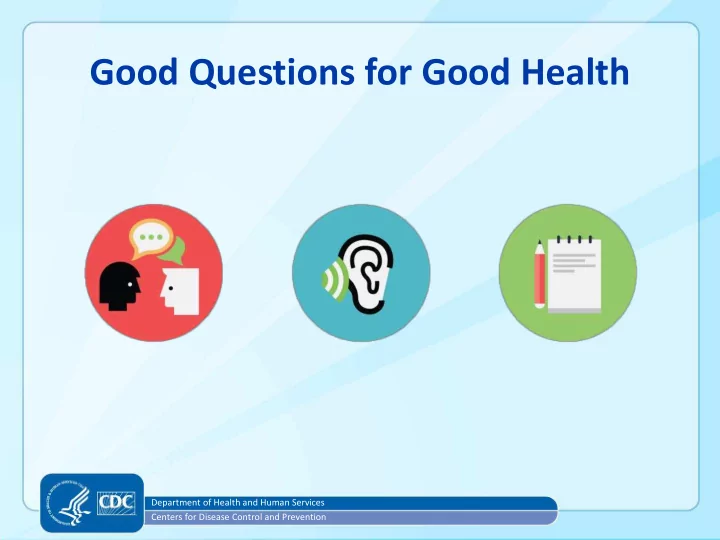

Good Questions for Good Health Department of Health and Human Services Centers for Disease Control and Prevention
What Do You Think is Happening? Doctor helping patient… ? ? She’s having trouble reading medicine label… Doctor reviewing medical test results with patient…
Sound Familiar? Have you ever had the experience of waiting an hour to see your doctor? Then you have 5 rushed minutes with her, and when it's all over, you don't know anything more than you did when you went in?
You are NOT Alone
Why is Asking Questions so Important? When you actively participate in the visit, you’ll – Be more satisfied – Be more likely to follow recommendations – Get better quality care – Get better results
Overview Finding Health Information Understanding Health Information Good Questions for Good Health Activity Discussion
Finding Health Information A survey of U.S. adults asked “Where did you turn to for health information the last time you had a serious health issue?” Ask a health Professional 70% Ask a friend or family member 60% Use the internet 59% Ask others who have the same health condition 24% Source: Pew Internet & American Life Project Survey, August-September 2012. N=3,014. Margin of error is +/-2%. *American adults 18 years and over
Online Health Information
Understanding Health Information
Good Questions for Good Health
Christina Cyphers’ Story Video from Questions are the Answer , Agency for Healthcare Research and Quality, U.S. Department of Health and Human Services. Patients-consumers/patient-involvement/ask-your-doctor/videos
Ramona Seidel, MD: “Asking Questions Empowers Patients” Video from Questions are the Answer , Agency for Healthcare Research and Quality, U.S. Department of Health and Human Services. Patients-consumers/patient-involvement/ask-your-doctor/videos
Before Your Appointment Write down your questions to bring to your appointment.
During Your Appointment
After Your Appointment
Create a List of Good Questions for Good Health
Use the Question Builder Use the question builder at Question Builder Application Questions are the Answer , Agency for Healthcare Research and Quality, U.S. Department of Health and Human Services. Patients-consumers/patient-involvement/ask-your-doctor/videos
When Should I Ask Questions? When you see your doctor or a nurse—or a pharmacist, even your dentist When you prepare for a medical exam or lab test
Other Helpful Tips Create a health history that includes your current conditions and past surgeries or illnesses. Bring it to your appointment Know your family’s health history, such as your parents’ health conditions Bring all your medicines with you Call your doctor’s office to find out test results. No news does not always equal good news!
Activity
Let’s Talk 1. Please read your questions 2. Let us know why you would ask these questions 3. Explain what clarification is needed from your doctor 4. Challenges?
Jane Kapustin, Nurse Practitioner Urges Patients to Ask Questions Video from Questions are the Answer , Agency for Healthcare Research and Quality, U.S. Department of Health and Human Services. Patients-consumers/patient-involvement/ask-your-doctor/videos
Discussion What if your doctor seems as though they are in a rush? How do you feel about changing doctors or getting a second opinion? Does your doctor ever call or email you to discuss lab results? How do you think your doctor would react to any outside research you’ve done regarding treatment plans or alternative medicine?
Ask Questions! Your questions help your health care team learn more about you Your doctor’s answers to your questions can help you make better decisions, receive better care, and avoid medical mistakes Your questions can also lead to better results for your health
Sources The content for this presentation was adapted from the following sources: The University of Georgia’s Health Literacy on Wheels project The Agency for Healthcare Research and Quality’s Questions are the Answer initiative
Recommend
More recommend